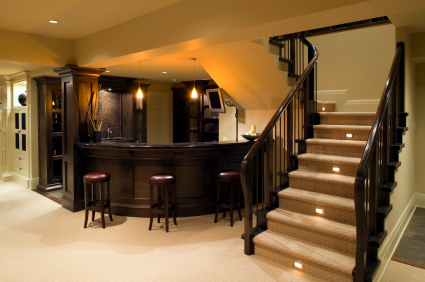As more people are deciding to stay in their home for a few more years rather than selling and moving up, the most obvious place to look for expansion is the basement. If your basement has been sitting unfinished, housing boxes and “stuff” for the last few years, why not turn it into usable space?
Finishing a basement can be exciting; it can also be a bit daunting. With so many choices, where do you begin?
 Once the designs are in place, the next most logical place to move is the décor; how will your finished basement look after its completed? Basements can be a wonderful addition in space; yet they can also cause unforeseen headaches if you don’t plan from the start. Basements present unique problems that you simply won’t have in the rest of the home. Between potential moisture problems, chilly air, concrete slabs and the potential for problems, it can be a lot to plan for when you’re making a selection that will look great and weather well in the process.
Once the designs are in place, the next most logical place to move is the décor; how will your finished basement look after its completed? Basements can be a wonderful addition in space; yet they can also cause unforeseen headaches if you don’t plan from the start. Basements present unique problems that you simply won’t have in the rest of the home. Between potential moisture problems, chilly air, concrete slabs and the potential for problems, it can be a lot to plan for when you’re making a selection that will look great and weather well in the process.
Basement flooring choices come down to three main areas of consideration: moisture, cold and budget.
The lower your basement is, the more susceptible to moisture it becomes. Here in Colorado, people rarely think of water being an issue. Yet any time your room is underground, you risk moisture coming into play. It can be tapped by hitting underground water sources. Or it can simply be a great place for water from irrigation and storms to accumulate if there are any foundation issues. In either case, if water gets in, the first place it will appear is on your basement floor.
Most basements are build on a concrete slab, which means your basement will receive coldness from two places: being underground and from the concrete up. Concrete is naturally cold, which means if you don’t use flooring materials to warm it up, your basement will be the coldest place in your home all winter long.
Keeping these two items in mind, certain products come to mind that are simply better for basements than other choices.
Laminate flooring is one of your better choices. You can have the look of hardwood flooring without the potential disaster natural hardwoods could be in the basement. Laminate flooring offers a very dense and thin cushion that insulates and quiets down the laminate sound of an engineered product. Make sure you work with a flooring consultant about your specific needs, as laminate flooring comes in many styles, options and with many qualities. Choose the wrong product and you may be facing problems sooner than you think.
Carpet is a good choice over a concrete basement floor because it breathes and will allow moisture emissions to escape. It has an insulating quality that will make your basement naturally warmer. Add a quality pad and you can easily create natural ambiance with the added benefit of warming up your room in the process.
Ultimately, your final selection should also come down to budget. There are many products today that will suit your needs perfectly. Come in today and let us help you find the perfect solution for your basement remodeling project.

For all of your Denver Hardwood Flooring needs visit our site today.
 inishing a basement may sound as easy as adding some flooring and furniture. However, you must remember that your basement is underground, which could pose some problems. When choosing flooring for your basement, keep the following tips in mind.
inishing a basement may sound as easy as adding some flooring and furniture. However, you must remember that your basement is underground, which could pose some problems. When choosing flooring for your basement, keep the following tips in mind.